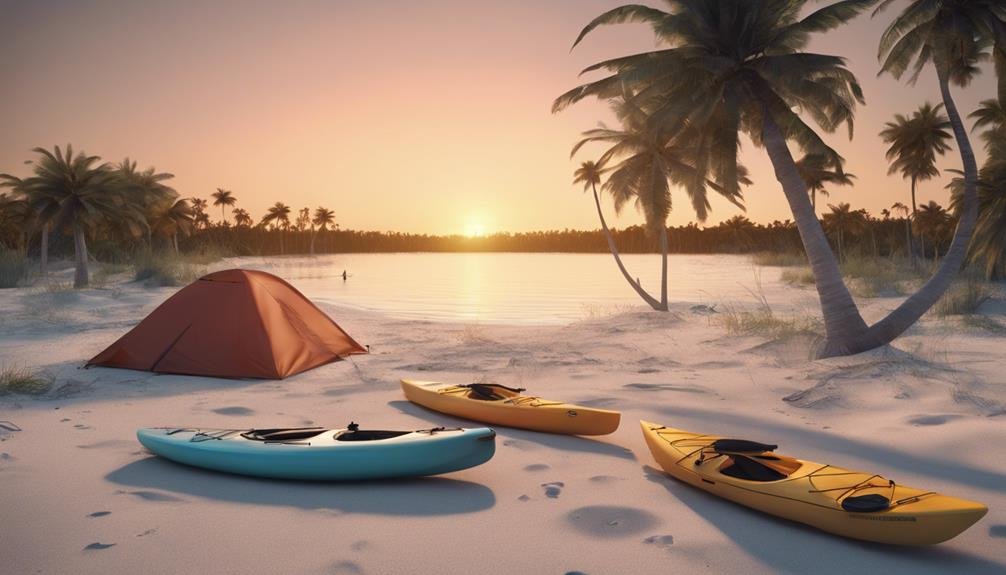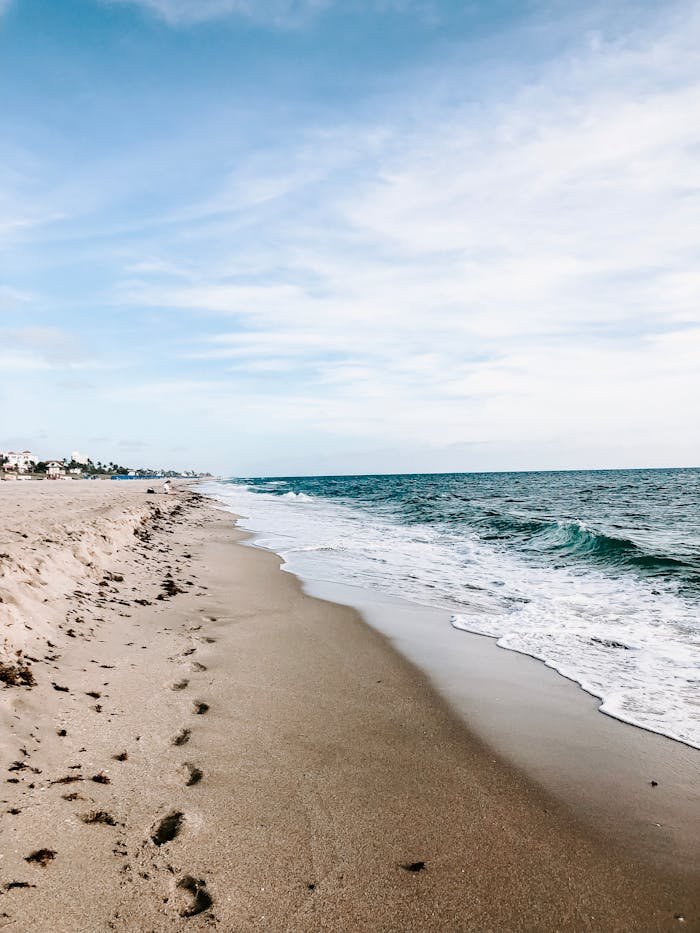As you plan to pitch your tent on Florida's stunning coastline, you'll discover a camping experience like no other. With over 660 public campsites and countless private options to choose from, you'll find a unique blend of natural beauty, recreational activities, and essential amenities. You'll need to secure the right permits, pack gear that can withstand ocean conditions, and follow regulations to ensure a safe and enjoyable stay. As you settle into your coastal retreat, you'll want to stay prepared for wildlife encounters, changing weather conditions, and nighttime safety – and with the right guidance, you'll be all set.
Key Takeaways
- With over 660 public campsites in Florida, research and choose a site that suits your needs, considering amenities and proximity to the beach.
- Obtain necessary permits, which vary by location and camping type, and be aware of deadlines, fees, and required information for applications.
- Pack essential gear, including a sturdy tent, comfortable sleeping bag, and first aid kit, to ensure a safe and enjoyable beach camping experience.
- Set up camp safely, securing equipment, assessing potential obstacles, and maintaining a tidy site to prevent hazards and ensure a peaceful experience.
Choosing the Best Campsite
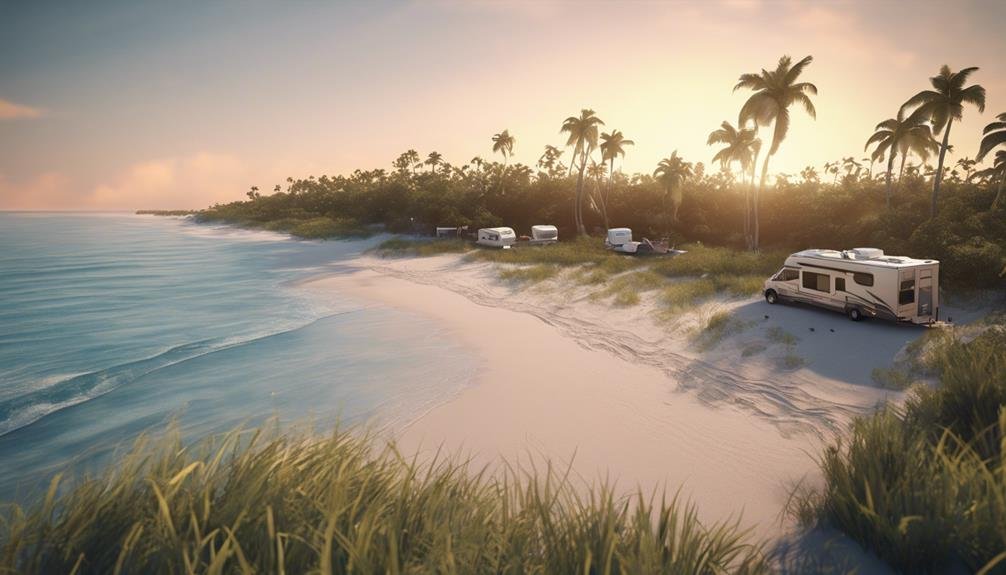
Where do you start when searching for the perfect beach campsite in Florida, a state with over 660 public campsites and thousands more at private campgrounds? You'll want to begin by making a list of priorities.
Are you looking for campsite amenities like flush toilets and showers, or are you okay with more primitive sites? Do you need electric and water hookups, or can you rough it with just a tent and a campfire?
Think also about the site cleanliness – you want a spot that's free from trash and debris. You may also want to consider proximity to the beach, as well as access to swimming, fishing, and other recreational activities.
If you have kids, you might want a campsite with a playground or a nature program. If you have pets, look for campsites that allow animals.
When searching online, check out photos of each campsite to get a sense of the layout and surroundings. With a little research, you'll be well on your way to finding the perfect beach campsite in Florida that makes you feel right at home.
Obtaining Necessary Permits
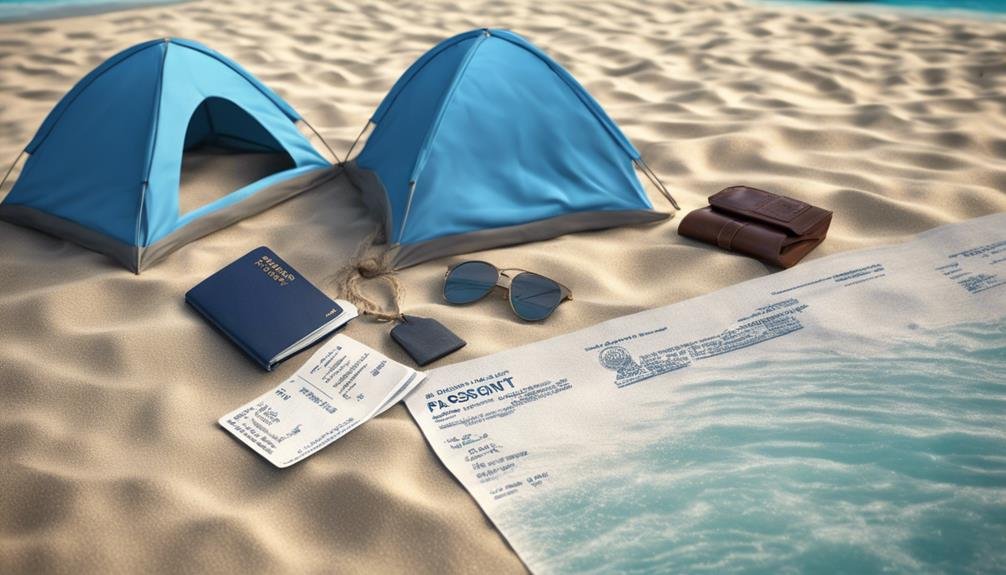
As you prepare for an unforgettable beach camping adventure in Florida, you'll want to make sure you're all set with the necessary permits.
You'll need to research the specific permits required for your chosen campsite, as well as the associated fees, to avoid any last-minute hassles.
Permit Requirements and Fees
Before you set up camp on Florida's beaches, you'll need to secure the necessary permits, which can vary depending on the location and type of camping you plan to do. Don't risk ruining your beach trip by overlooking these crucial permits or failing to pay required fees.
Research the permit deadlines for your chosen beach, as these can be strict – miss the deadline, and you may need to choose a different location or postpone your trip. Once you obtain your permit, make sure you understand the renewal requirements, so you can plan for future beach camping trips.
When applying for a permit, you'll typically be required to provide basic information about yourself, your campsite setup, and the activities you plan to do. Be prepared to pay fees, which help protect the state's beautiful beaches and ecosystems.
Types of Permits Needed
Now that you know why permits are required and how to secure them, you'll want to identify the specific types of permits needed for your beach camping trip, which can vary depending on the location, type of camping, and activities you have planned.
As you're preparing for an unforgettable outdoor adventure in Florida, you'll likely need to obtain outdoor recreation permits. These permits ensure that you're allowed to engage in activities like campfires, fishing, or hiking in designated areas.
In addition to outdoor recreation permits, you may also need permits related to coastal land usage. These permits regulate activities that impact the coastline, such as beach driving, boat launching, or camping in sensitive habitats.
If you plan to camp in a state or national park, you may need a specific permit for that location. It's also possible that you'll need permits from local authorities, such as county or city governments, depending on the location of your campsite.
Permit Application Process
To secure the necessary permits for your beach camping trip in Florida, you'll need to navigate the permit application process, which can be done online, in person, or by mail, depending on the issuing authority.
Start by checking the website of the Florida Department of Environmental Protection or the National Park Service to determine which permits you need. Some permits, like those for campsites, can be reserved through the campsite reservation process.
Once you've determined which permits you need, you'll need to fill out the application form and provide the required documentation. Be sure to submit your application well in advance of your trip, as processing times can take several weeks.
If you're a repeat camper, take note of the permit renewal timeline to avoid any lapses in your permits.
Remember to carefully review the application requirements and follow the instructions carefully to avoid any delays or rejections.
With your permits in hand, you'll be all set to enjoy a stress-free beach camping trip in Florida!
Packing Essential Gear
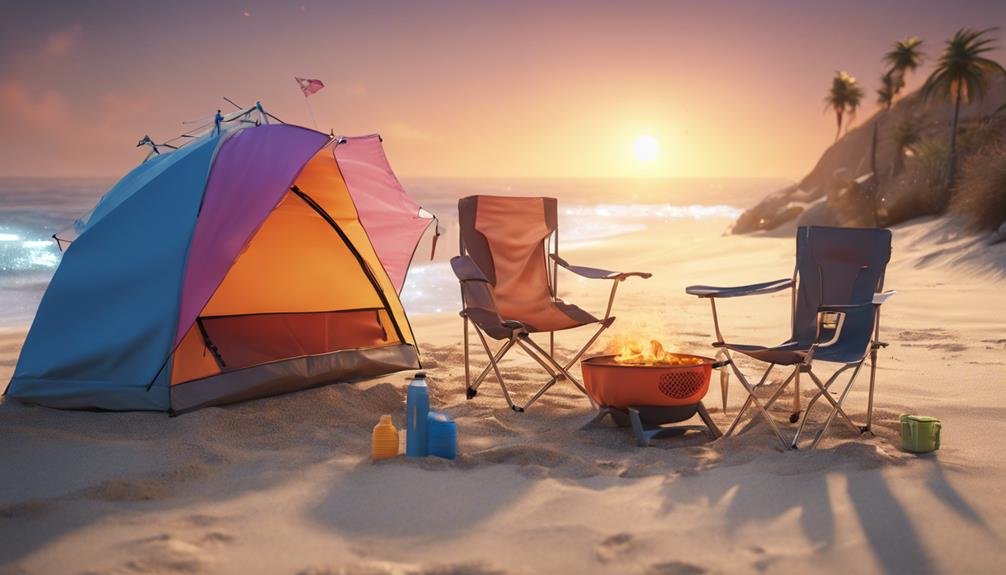
You'll want to gather at least a dozen must-have items, including a sturdy tent, comfortable sleeping bag, and reliable water purification system, to ensure a stress-free and enjoyable beach camping experience in Florida.
Start with the basics: a well-ventilated tent that can withstand ocean breezes and scorching sun. Make sure it's easy to set up and has proper tent ventilation to keep you cool and dry. Don't forget a comfortable sleeping bag, sleeping pad, and a warm blanket to cozy up with on chilly evenings.
Next, consider your food storage requirements. Bring a cooler with ice packs to keep your perishables fresh, and store your food in airtight containers to keep pests at bay. A portable stove or camping grill will come in handy for meal prep.
Other essentials include a first aid kit, sunscreen, insect repellent, and a reliable water purification system to ensure access to clean drinking water. Remember to pack a map, compass, and flashlight to navigate your surroundings.
With these essentials, you'll be well-equipped for a fun and safe beach camping adventure in Florida.
Setting Up Camp Safely
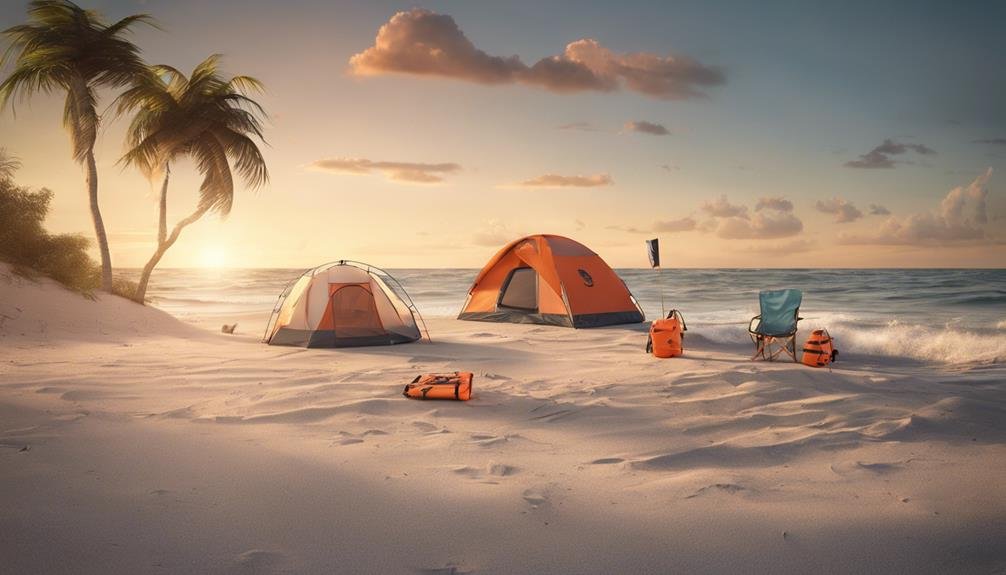
As you arrive at your beach campsite, loaded with all the right gear, your focus shifts to setting up a safe and secure base that will allow you to fully enjoy the sun, sand, and surf of Florida's stunning coastline. You'll want to scope out the area, taking note of any potential obstacles like loose sand, jagged shells, or slippery rocks. Securing your camping equipment is crucial, so make sure to stake down your tent firmly and weigh down any loose gear that could become a projectile in the wind.
Know your surroundings: Familiarize yourself with the tide schedule and any nearby water hazards, like riptides or strong currents.
Choose a safe spot: Avoid setting up camp near beach obstacles like piers, jetties, or sharp rocks that could pose a hazard, especially at night.
Keep a tidy campsite: Keep your gear organized and secured to prevent tripping hazards and loss due to theft or wind.
Beach Camping Regulations
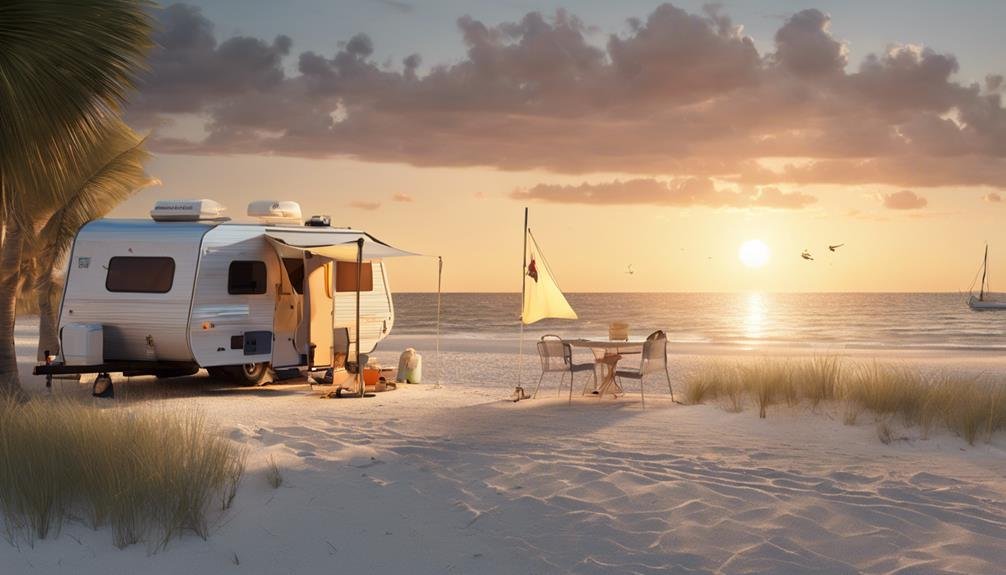
As you prepare to spend the night under the stars on Florida's stunning beaches, you'll need to get familiar with the regulations that'll keep you and the environment safe.
You'll want to know about the necessary permits, rules for choosing the perfect campsite, and quiet hour restrictions to ensure a peaceful experience for all.
Permit Requirements
Before pitching your tent on Florida's sun-kissed shores, obtaining the necessary permits is a crucial step in ensuring a stress-free beach camping experience. You'll want to familiarize yourself with the permit requirements to avoid any last-minute hassles.
Prohibited items: Make sure you're not bringing any prohibited items, such as fireworks, glass containers, or metal detectors, to the campsite.
Permit renewals: If you plan to extend your stay, be aware that permit renewals may not be automatic, and you may need to reapply.
Special permits: Some activities, like fishing or boating, may require special permits or licenses, so be sure to check with the relevant authorities.
Campsite Selection Rules
With your permits in hand, you're now ready to choose the perfect spot to set up camp, and understanding the campsite selection rules will help you pick a beachfront location that meets your needs and complies with Florida's beach camping regulations.
As you scan the shoreline, consider the campsite amenities that matter most to you. Do you need access to restrooms, showers, or potable water? Some beach campsites offer these amenities, while others are more primitive.
You'll also want to think about site accessibility. Can you easily reach the site with your gear, or will you need to hike a long distance? Some beach campsites are designed for RVs and trailers, while others are better suited for tent campers. Look for signs indicating which sites are reserved for which type of camping.
Additionally, consider the natural environment and any potential hazards, such as sea turtle nesting sites or areas prone to erosion. By considering these factors, you can choose a campsite that's both comfortable and responsible.
Remember to respect the natural environment and follow all posted rules to ensure a safe and enjoyable beach camping experience in Florida.
Quiet Hour Restrictions
Florida's beach camping regulations include quiet hour restrictions to help you and other campers, as well as nearby residents, enjoy a peaceful night's sleep, so you'll need to keep noise levels down during certain hours of the evening and early morning. Typically, quiet hours are between 10 PM and 8 AM, but be sure to check with the campsite for specific noise level policies. You're here to relax and unwind, and so are your fellow campers.
To ensure everyone has a great time, follow these guidelines:
- Keep the volume low on your music and generators during quiet hours. You can still enjoy your tunes, just keep them to a reasonable level.
- Refrain from loud conversations and boisterous laughter during quiet hours. Remember, you're not the only one trying to get some rest.
Wildlife and Pest Precautions
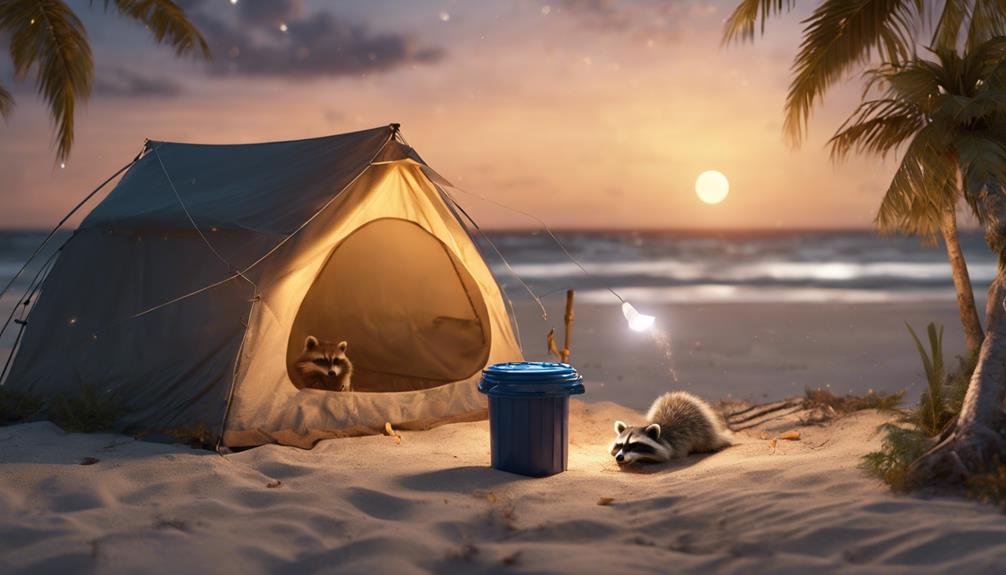
As you settle into your beachside campsite, you'll want to take steps to protect yourself and your gear from the wildlife and pests that call the Sunshine State's coastline home. You're now a part of their world, and being mindful of animal encounters is crucial. Raccoons, opossums, and sea turtles are just a few of the creatures you might meet, and while they might seem friendly, keeping a safe distance is essential. Store your trash and food properly, and never feed the wildlife, as this can harm both you and the animals.
As a beachgoer, your impact on the environment is significant. Be aware of nesting sites and avoid disturbing them. If you encounter any injured or stranded animals, contact local authorities for assistance.
Mosquitoes, sand flies, and other biting insects can also be a nuisance, so don't forget to pack insect repellent. By taking these simple precautions, you'll not only ensure a safe and enjoyable camping experience, but also contribute to preserving the natural beauty of Florida's coastline for future generations. By being a responsible beach camper, you're part of a community that values and protects the Sunshine State's unique wildlife and ecosystem.
Managing Coastal Weather
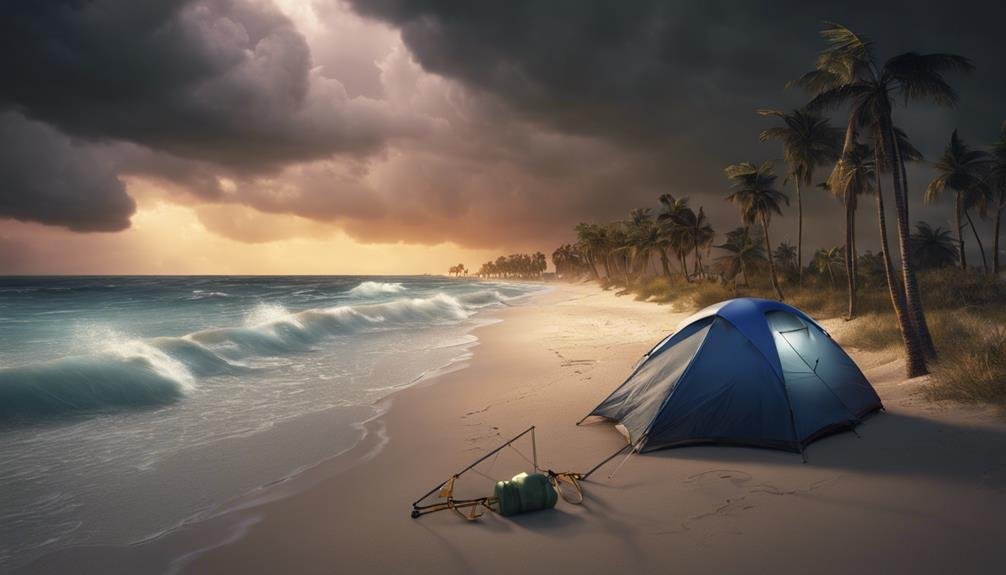
Your beachside camping adventure can quickly turn into a battle against the elements if you're not prepared for the unpredictable and often turbulent coastal weather that rolls in from the Atlantic Ocean and Gulf of Mexico.
Florida's seasonal weather patterns can bring scorching heat, sudden thunderstorms, and even tropical storms. To ensure a safe and enjoyable trip, it's crucial to stay informed about the latest weather forecasts and be prepared for any situation.
Monitor weather forecasts: Keep an eye on local news and weather reports to stay informed about any weather advisories or warnings.
Pack for all conditions: Bring sunscreen, rain gear, and warm clothing to be prepared for changing weather conditions.
Have a tropical storm preparedness plan: Know the evacuation routes and emergency shelters in case of a tropical storm warning.
Maintaining a Clean Campsite
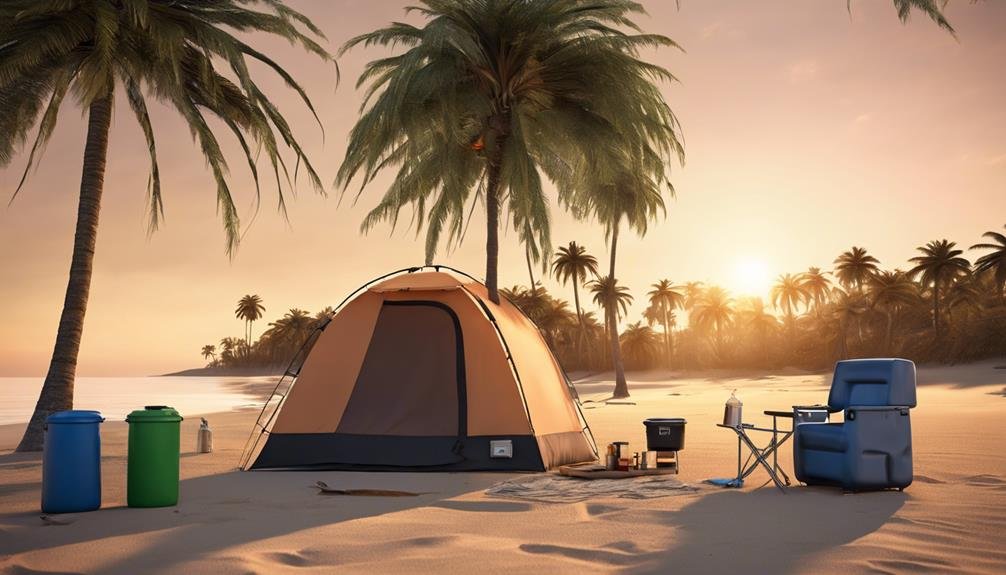
While managing coastal weather is key to a safe beachside camping trip, you'll also want to focus on keeping your campsite tidy to avoid attracting wildlife and preserve the natural beauty of the shore.
As you're setting up your campsite, make sure you're also packing clean up supplies, like trash bags, a small shovel, and hand sanitizer. This will make it easier to keep your site clean and hygienic throughout your trip.
As you enjoy the sun, sand, and surf, remember to dispose of trash properly. Don't leave food scraps, plastic bottles, or other waste lying around – it's not only unsightly, but it can also harm local wildlife.
Instead, take a few minutes to tidy up after each meal, and make sure to throw away trash in the designated receptacles. By keeping your campsite clean, you'll not only be preserving the natural beauty of the shore, but you'll also be contributing to a sense of community and belonging among fellow beachgoers.
Staying Safe at Night
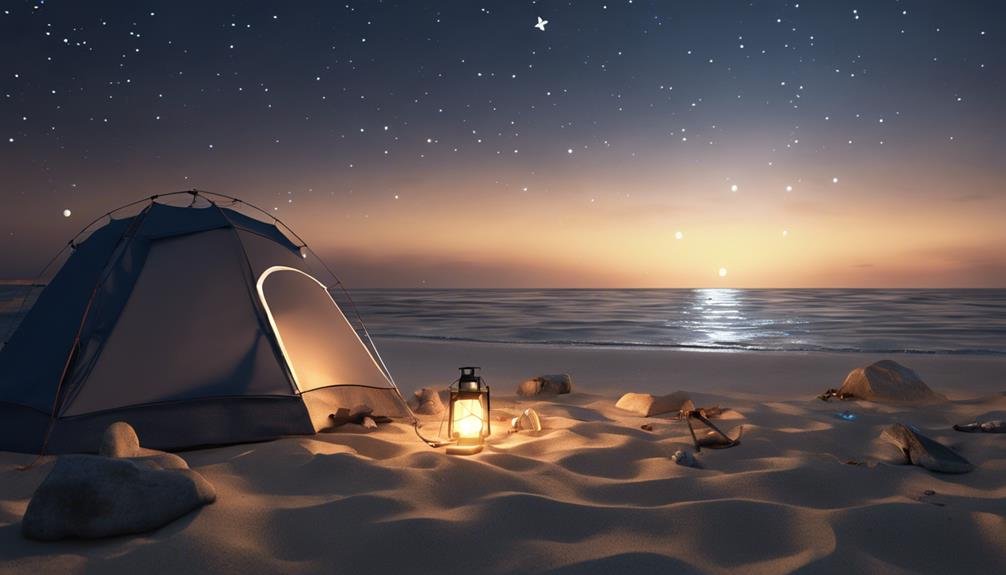
Nightfall on the beach can be both breathtaking and bewildering, so take necessary precautions to ensure a peaceful and incident-free slumber under the stars.
As you settle into your campsite, securing it for the night is crucial. Make sure to store your valuables in a safe place, such as a locked container or a secure bag, and keep a watchful eye on your belongings.
- Mark your campsite with reflective tape or glow sticks to avoid accidents
- Keep a phone nearby in case of emergencies and make sure it's fully charged
As you drift off to sleep, the soothing sounds of the waves can be a lullaby, but don't let the tranquility fool you. Staying safe at night requires attention to your surroundings and a healthy dose of caution. By taking these simple steps, you'll be able to enjoy the serenity of the beach at night, knowing you're secure and prepared for any situation that may arise. With a little planning and awareness, you'll be sleeping under the stars in no time.
Conclusion
As you pack up your beach campsite, the warm Florida sand slips away like grains of time.
Your camping adventure may be over, but the memories will linger, shimmering like the sun on the ocean's surface.
Remember to take the lessons you've learned and the thrill of the experience with you, and you'll be hooked on beach camping like a fish on a hook, eagerly reeling in the next adventure.
